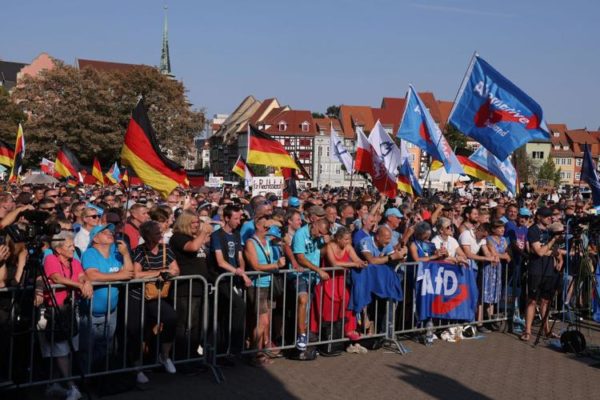POLITICS
Far-Right Party Heads For Its Strongest Result Yet In Germany’s Election

Alternative for Germany appears to be heading for its strongest national election result yet this month and is fielding its first candidate to lead the country. Even though it’s highly unlikely to take a share of power soon, it has become a factor that other politicians can’t ignore and helped shape Germany’s debate on migration.
The far-right party first entered Germany’s national parliament eight years ago on the back of discontent with the arrival of large numbers of migrants in the mid-2010s, and curbing migration remains its signature theme. But the party has proven adept at harnessing discontent with other issues: Germany’s move away from fossil fuels, restrictions during the COVID-19 pandemic and support for Ukraine after Russia’s full-scale invasion nearly three years ago.
How did it start?
Alternative for Germany, or AfD, was founded in 2013 and initially focused on opposition to bailouts for struggling countries in the eurozone debt crisis — measures that then Chancellor Angela Merkel described as “without alternative.” It was sometimes known as a “party of professors,” a reference to leading figures in the early days, though it already had a strong streak of hard-right, anti-establishment identity.
Over the years, AfD became more radical and repeatedly changed leaders. It was Merkel’s decision in 2015 to allow in large numbers of migrants that supercharged it as a political force, and in the 2017 national election, it won 12.6% of the vote to take seats in the German parliament for the first time.
Where does it stand now?
After returning to parliament in 2021 with reduced support of 10.3%, AfD picked up strength as Chancellor Olaf Scholz’s center-left government bickered through a series of crises — some of its own making — and finally collapsed.
Germany saw a wave of protests a year ago triggered by a report that right-wing extremists met to discuss the deportation of millions of immigrants, including some with German citizenship, and that AfD members were present.
But that didn’t do long-term poll damage to AfD. It finished second in the European Parliament election in June, and in September, the best-known figure on its hardest-right wing, Björn Höcke, secured the first far-right win in a state election in post-World War II Germany.
AfD is going into the Feb. 23 election with renewed confidence and radical language. Alice Weidel, its first candidate for chancellor, has embraced the term “remigration” as the party calls for large-scale deportations of people with no legal entitlement to be in Germany — a politically loaded word that featured in last year’s controversy.
AfD calls for the immediate lifting of sanctions against Russia and opposes weapons deliveries to Ukraine. It wants Germany to reintroduce a national currency and for the European Union to be turned into a looser “association of European nations,” though it isn’t explicitly advocating leaving the 27-nation bloc.
Germany’s domestic intelligence agency has the party under observation for suspected right-wing extremism. The AfD’s branches in three eastern states are designated “proven right-wing extremist” groups. AfD strongly objects to those assessments and rejects any association with the Nazi past. Höcke has appealed two convictions for knowingly using a Nazi slogan at a political event.
Who supports it?
AfD has support across Germany and is represented in all but two of the 16 state legislatures, but the party is strongest in the formerly communist and less prosperous east.
It has a unique ability to seize on issues “that other parties don’t handle with this clarity, with this intensity, with this radicalism and this emotionality,” said Wolfgang Schroeder, a political science professor at the Berlin Social Science Center. “And on top of that, it’s an internet party and from the beginning used the emotionalizing power of the internet for its own communication — much better than all other German parties together.”
That has helped it to perform strongly among young voters in recent regional elections. The party portrays itself as an anti-establishment force at a time of low trust in politicians, sometimes dismissing the “old parties” as a “cartel.”
Schroeder described it as “something like an aircraft carrier for resentment and anger.” Other parties say they won’t work with it.
Who are its friends abroad?
AfD’s rise has coincided with that of far-right parties in many other European countries, including Austria’s Freedom Party and the National Rally in France, with which it has plenty of common ground. Weidel was in Budapest to visit Hungarian Prime Minister Viktor Orbán on Wednesday.
However, it isn’t part of those parties’ Patriots for Europe group in the European Parliament after some tensions before last year’s EU elections. AfD was thrown out of one of the group’s predecessors after its leading candidate at the time, Maximilian Krah, said that not all Nazi SS men “were necessarily criminals.”
The party has found an enthusiastic supporter in billionaire Elon Musk, a close ally of U.S. President Donald Trump. Musk has declared that “only the AfD can save Germany.” He held a live chat on X with Weidel and appeared live by video link at an AfD campaign rally.
At that rally, Weidel vowed to “make Germany great again” in an echo of the U.S. president’s slogan.
Kerstin Sopke contributed to this report.







